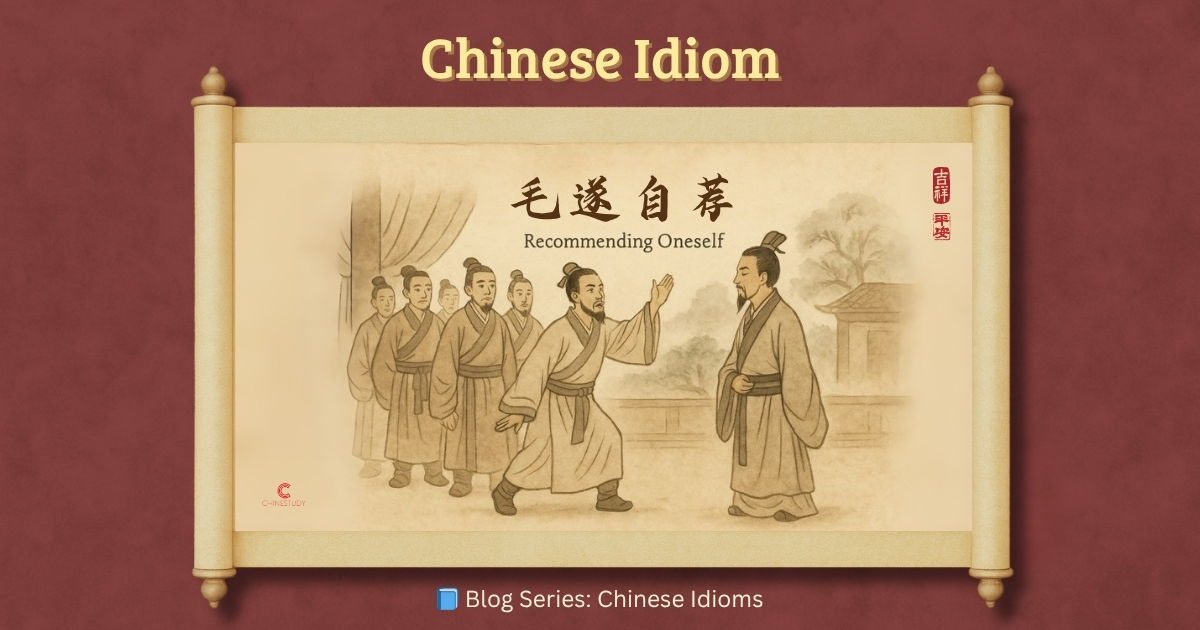🙋♂️ 毛遂自荐 máo suì zì jiàn – Boldly Recommend Yourself

🔍 What It Means
毛遂自荐 (máo suì zì jiàn) literally means:
“Mao Sui recommends himself.”
Word-by-word breakdown:
- 毛遂 (Máo Suì) – a person’s name
- 自 (zì) – self
- 荐 (jiàn) – to recommend
It means: To volunteer yourself for a task or opportunity.
You’re confident in your ability — and you’re not afraid to speak up and go for it.
In English, it’s like saying:
- 🙋♂️ “I’ll do it!”
- 💪 Volunteering for a challenge
- 🎯 Confidently stepping forward
🏺 Where It Comes From
This idiom comes from a real story during the Warring States period (B.C. 475—B.C. 221).
The State of Zhao was under threat from the powerful State of Qin. The Zhao king wanted to form an alliance with the State of Chu, but no one knew who could speak well enough to persuade them.
A diplomat named Pingyuan Jun planned to take 20 followers with him to Chu.
A low-ranking follower named Mao Sui (毛遂) wanted to join. He stepped forward and said:
“I want to go. I recommend myself.”
Pingyuan Jun looked surprised. He had never heard of Mao Sui before. So he asked:
“Sir, how long have you been in my service?”
Mao Sui replied, “Three years.”
Pingyuan Jun frowned and said:
“A talented man is like an awl (a sharp tool).
If you put it in a bag, the tip should poke through right away.
You’ve been here for three years, and no one has praised your talents.
You must not be that special.
I think you should stay behind.”
But Mao Sui wasn’t afraid. He answered:
“That’s exactly what I’m asking — please put me into the bag today.
If you had done it earlier, not only the tip —
the whole awl would have popped out, standing tall like a full grain spike!”
Pingyuan Jun was impressed and agreed to let him come.
Later, when negotiations with Chu grew tense, Mao Sui jumped into the conversation, boldly challenged the Chu king, and successfully secured the alliance.
His courage and timing became a symbol of:
🗣 Speaking up
🚀 Stepping forward
💪 Seizing your moment
💬 How to Use It
Use 毛遂自荐 (máo suì zì jiàn) when:
- You volunteer yourself confidently
- You take the initiative to speak up or help
- You want to show you’re ready even if no one asks
✅ Common in:
Job interviews, team discussions, school projects, and more.
❌ Not for:
Bragging or pushing others out of the way — it’s about courage and timing, not arrogance.
🎯 Real Examples
1.
面试时,她毛遂自荐,说自己有相关经验。
(Miànshì shí, tā máo suì zì jiàn, shuō zìjǐ yǒu xiāngguān jīngyàn.)
👉🏻 In the interview, she recommended herself and said she had relevant experience.
2.
项目开始没人愿意负责,他毛遂自荐,主动接下任务。
(Xiàngmù kāishǐ méi rén yuànyì fùzé, tā máo suì zì jiàn, zhǔdòng jiē xià rènwù.)
👉🏻 When no one wanted to take the lead, he stepped up and volunteered to take charge.
⚠️ Common Mistakes (Watch Out!)
❌ Misuse: Saying 毛遂自荐 (máo suì zì jiàn) to mean someone was chosen by others
✅ Correct: It must mean you put yourself forward
❌ Misuse: Using it when someone boasts after success
✅ Correct: It describes the moment of volunteering, not the celebration after
💡 Memory Tip
毛遂自荐 (máo suì zì jiàn) = Mao Sui + self + recommendation
📌 Think of someone standing up in a crowded room, raising their hand:
“I can do it. Let me try.”
You don’t wait to be chosen — you choose yourself.
🧩 Interactive Practice
Translate this sentence into English:
- 他不是等别人来问,而是毛遂自荐。
Answer:
He didn’t wait for others to ask — he volunteered himself.
🌟 Final Thoughts
毛遂自荐 (máo suì zì jiàn) reminds us:
🌱 Sometimes the opportunity won’t come unless you speak up.
If you believe you can — say so. That’s how new journeys begin.
🏮 One story ends, but many more await…
👉 Stay tuned for the next idiom in this series!
Thank you for subscribing!
Have a great day!